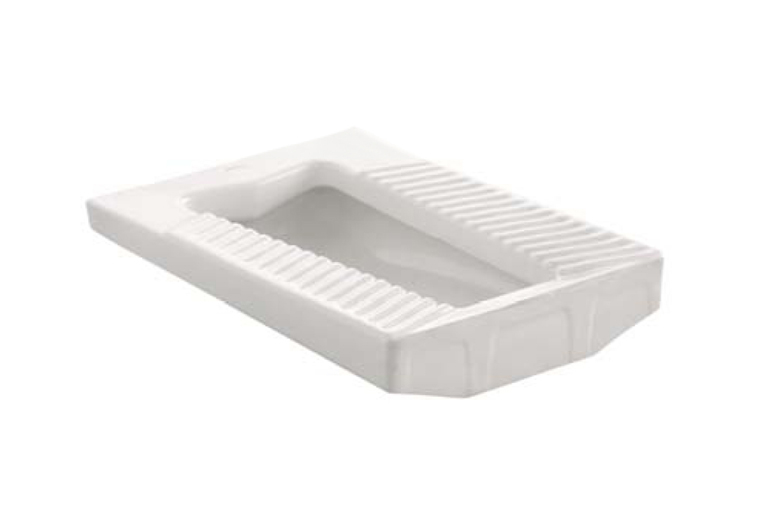Towns and communities are quickly experiencing a lack of available capacities for housing refugees from conflict zones. One important aspect for setting up existing and new emergency shelters are the sanitary facilities for a large number of people. The members of the Blue Responsibility initiative have quickly reacted to the current demand, offering cost efficient, flexible and easy-to-install sanitary solutions which also ensure the highest standards of hygiene.
Around 1.1 million refugees came to Germany in 2015 – the highest number of asylum seekers ever recorded. And still large numbers of people from conflict zones keep arriving in Germany. Quickly providing living quarters is a huge logistical challenge for many towns and communities, particularly when it comes to providing enough sanitary facilities. The requirements for the sanitary solutions are high: not only do they have to be affordable and highly flexible, but also robust and easy to remove again. The German sanitaryware industry offers modular systems for fast and flexible installation as well as complete prefabricated bathrooms.
From installation elements to prefab bathrooms
The installation of sanitary facilities can be very time consuming. Prefabricated installation elements, e.g. from Geberit, facilitate fast installation in drywall construction and are available for all sanitary items. They are self supporting and suitable for installation in partition walls, internal walls and lightweight walls as well as in half height and full height in-wall installations. All Geberit installation elements can additionally be combined with a push-to-connect system, providing a simple and economical draining solution. Prefabricated sanitary walls further optimise the building process. The advantage: all sanitaryware is preinstalled at the factory. This allows all required pipes for drinking water, heating, wastewater and flushing to be integrated into a sturdy supporting frame. Sound protection and fire protection systems are also integrated. The finished walls are supplied to the construction site “just in time” on the day of installation.
Complete prefabricated bathrooms from one source
When time is an issue, prefabricated bathrooms, e.g. from Geberit, can offer the right solution. These are fully equipped with cistern, flush plate, toilet bowl, sink, shower, mirror and pipes for drinking water supply and wastewater draining. Heating is provided by a heating panel in the wall while ventilation is ensured by a flush mounted fan. Electric cabling complies with standards and is safely preinstalled and prepared for an electric water heater, heating and a waste pump. An electric water heater and a small waste pump system for connecting to higher level drainage systems are optionally available. Another special feature: the prefabricated bathroom has a lockable door. “What we take for granted, is sheer luxury for people in emergency shelters. The bathroom is often the only lockable room in the entire group of buildings. This makes the sanitary facilities an important refuge for these people, where they can enjoy a few minutes of privacy,” explains Volker Röttger from Geberit. The complete bathroom is prefabricated at the factory and delivered to the place of use in modules or as a compact unit. With external dimensions of 1.8 m x 1.8 m, the prefab bathroom is very space saving. If required, several bathrooms can be installed side-by-side and connected. Afterwards, they can be reused, e.g. for festivals or events.
Respecting religious and cultural differences
Different countries have different customs – that also applies to hygiene and the requirements for sanitary facilities. Standard sitting toilets, as in Germany, are unusual in many countries. Many parts of the world use squat toilets which require no skin contact with the toilet bowl. Keramag therefore offers a particularly robust ceramic squat toilet especially for emergency shelters or refugee housing. These can be installed quickly and according to standard as individual products or in combination with an in-wall cistern from Geberit. In addition to traditional installation in a bed of mortar with a barrier, there is another option which facilitates installation: for the dry construction version, a polystyrene block replaces the bed of mortar, with recesses for drain and flush pipes already provided in the polystyrene.
Religious customs also influence personal hygiene. Many of the refugees are Muslims who require solutions for ritual washing. For foot washing, for example, a sink can be mounted at a low height (60 cm). But toilet versions with running water are also in demand. Shower toilets only arrived on the German market a few years ago and are usually only installed in high quality bathrooms. The manufacturer Schell has therefore developed a low cost alternative with a hygiene shower which complies with the religious requirements while also ensuring drinking water hygiene. The combination of cistern and hygiene shower consists of a special cistern mounted high with pull chain, angle control valve and flush pipe as well as chrome plated hygiene shower, shower hose and wall bracket. The high mounting position of the cistern creates the required hydrostatic pressure for use of the hygiene shower. This means the toilet can be used to Western standards or with the hygiene shower and complies with the requirements of EN 1717.
German sanitaryware industry accepts social responsibility
With easy-to-install, cost efficient sanitary solutions, the German sanitaryware industry helps to meet the urgent demand for living spaces for refugees, taking into account cultural requirements as well as economic and ecological factors. “The German sanitaryware industry strives to support the improvement of the living conditions in emergency shelters through its power of innovation. That is why quality manufacturers are urgently working on special solutions which can be installed quickly,” says Wolfgang Burchard, spokesman for Blue Responsibility.
Further details regarding this topic can be obtained on the manufacturers' websites www.geberit.de, www.keramag.de und www.schell.eu.
